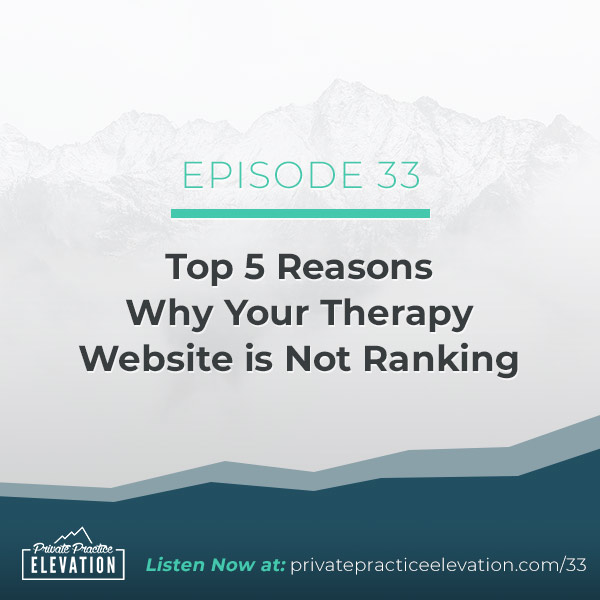In this episode of the Private Practice Elevation podcast, I’m going to share with you the 5 most common reasons why your website doesn’t rank for your keywords.
One question we receive a lot is “how come my therapy website doesn’t rank for any of my keywords?”.
After performing many SEO audits for therapists and private practices, we’ve seen a pattern emerge of some of the missing elements needed to rank a website well for keywords that matter to the business.
Many therapists believe if they just have a few pages on their website with a few keywords on those pages that you should show up in search results.
Unfortunately, SEO just isn’t that simple.
While it may be possible to begin ranking this way, chances are your website will rank very poorly and you won’t be getting any traffic from search engines at all.
There are many factors that impact how well or how poorly your private practice website ranks.
So give a listen or read on if you’re wondering why your website isn’t getting you any traffic from Google.
In This Episode, You’ll Learn:
- The type of content you need to create in order to rank well and why long content is not always enough
- One of the most important factors for creating authority with your website so that Google ranks you higher
- Why the usability of your website, and not just the content matters when it comes to ranking your keywords
- What types of keywords you should look for when creating your SEO strategy
This Episode Is Brought To You By
The Top 5 Reasons Why Your Therapy Website is Not Ranking
1: You don’t have quality content devoted to each keyword
Google doesn’t like generalist websites.
You must think of your website as an expert resource of information for your potential clients, answering specific questions.
If you don’t have detailed content written for each keyword that you want to rank for, then you’re just not going to rank.
This content has to be stellar.
Text length is important, and longer is better, but this needs to be high-quality content your potential clients will find useful.
It has to go deep into a specific service or a specific topic in the case of a blog post.
If you lack a sufficient amount of content, it will be hard for search engines to understand what keywords the website is focused on.
They will have no reason to recommend your website over another website that’s jam-packed with specific content focused on specific keywords.
2: You haven’t optimized each page or post for search engines
This is where on-page SEO comes into play.
So once you’ve got some quality content on your website, you have to make it as easy as possible for search engines to actually discover that content.
You want to make sure to have your keywords appearing in the right place of each page and blog post to help search engines understand what the information is about.
Places like the URL, the page’s title tag and the H1 tag all are clear indicators to Google for the what the page is about.
If you’re using WordPress, I recommend using Yoast SEO to help you analyze your content and make sure you put keywords in the proper places.
3: Your private practice website doesn’t have enough quality backlinks
A backlink is the equivalent of a vote for your website.
When Google sees another website linking to yours, it shows trust and authority.
Google thinks, “hey, I see this other website about anxiety linking to this private practice with content on anxiety. It must be good!”.
The more backlinks you have, the more authority is built for your website and the higher your rank will be.
Backlinko even included it as the 5th most important ranking factor for your website.
I’ve even heard it said that it’s the 2nd most important factor after great optimized content.
Either way, links are a great indicator to Google about the authority of your content and can help boost your ranking.
4: Your therapy website doesn’t have a good user experience
Google wants to provide the best results and best experience to its users.
And Google can tell if your website usability is poor.
They can tell this by metrics like bounce rate and the time that people are spending on your website.
You can find these in your Google Analytics under Audience > Overview:
If these numbers are low, it means that people are not sticking around to engage with the content.
You’ll want to do what you can to make sure that people are using your website and not just landing on the page.
Writing engaging, quality content is step number one.
Embedding infographics and videos can help take it even further and get people to stay longer on the website.
It’s also important that your website design is clean and people can use the website easily, otherwise, they may leave at a more rapid rate, making those metrics above much lower.
5: You need better keywords for your private practice
We were recently working with someone who wanted some SEO work done on their website.
She was taking on a new associate and wanted to make sure her website was bringing in referrals she could pass on to her new hire.
When asked which keywords she wanted to optimize for she mentioned “experienced male therapist”.
Sounded great but there was only one problem: no one was using that term to search for a therapist.
We know this because we used Ubersuggest to do a quick analysis of the keyword:
So there’s no sense in creating any content focused on that keyword, because no one is searching for that. At least not with enough monthly frequency to make it into keyword tools like Uberssuggest.
It’s just too broad.
Focusing in on a more specific keyword, based on her new therapist’s expertise, would be far more strategic.
For example, she could try something like “anxiety therapist in Atlanta”:
You can see that 110 people are searching that term each month, so it would be a good place to start building some content around.
You also want to make sure the keyword you’re trying for is not too competitive.
It’s going to be really hard to outrank other websites when your website is brand new and has little domain authority.
The goal is to find some specific keywords (using a tool like Ubersuggest or Semrush) that have a decent amount of monthly searches and not a high Search Difficulty.
You’ll have a better shot at ranking for those ones.
Conclusion
You can use this list above to better understand why your private practice website may not be ranking well for the keyword your potential clients may be using.
If you need some help getting your website’s SEO on par so that your clients can find you, you can learn more about our SEO services here.
Subscribe & Review in iTunes
If you’re not yet subscribed to the podcast I want to encourage you to do that today. This is the best way to make sure you don’t miss an episode! Click here to subscribe on iTunes.
And if you’re feeling extra generous, I’d love to hear what you think about the podcast. Reviews help others find the podcast plus I’d really love to hear what you think! Click here to leave a review. Just click on “Ratings & Reviews” then “Write a review.” Let me know what you like best about the podcast.
Thank you!


